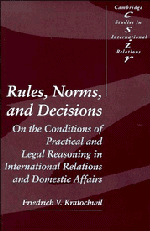 Rules, Norms, and Decisions
Rules, Norms, and Decisions Book contents
- Frontmatter
- Contents
- Acknowledgements
- Introduction: The resort to norms
- 1 Rules, norms, and actions: laying the conceptual foundations
- 2 Anarchy and the state of nature: the issue of regimes in international relations
- 3 The emergence and types of norms
- 4 The force of prescriptions: Hume, Hobbes, Durkheim, and Freud on compliance with norms
- 5 The discourse on grievances: Pufendorf and the “laws of nature” as constitutive principles for the discursive settlement of disputes
- 6 The notion of “right”
- 7 The question of “law”
- 8 The path of legal arguments
- Conclusion: The international legal order, international systems, and the comparative analysis of the practice of states
- Notes
- Index
Conclusion: The international legal order, international systems, and the comparative analysis of the practice of states
Published online by Cambridge University Press: 01 June 2011
- Frontmatter
- Contents
- Acknowledgements
- Introduction: The resort to norms
- 1 Rules, norms, and actions: laying the conceptual foundations
- 2 Anarchy and the state of nature: the issue of regimes in international relations
- 3 The emergence and types of norms
- 4 The force of prescriptions: Hume, Hobbes, Durkheim, and Freud on compliance with norms
- 5 The discourse on grievances: Pufendorf and the “laws of nature” as constitutive principles for the discursive settlement of disputes
- 6 The notion of “right”
- 7 The question of “law”
- 8 The path of legal arguments
- Conclusion: The international legal order, international systems, and the comparative analysis of the practice of states
- Notes
- Index
Summary
With the demonstration of the special nature of reasoning with rules employed in the third-party mode, the systematic exposition of my argument concerning rules and norms has come to an end. This exposition began in chapter 3, after the evaluation of the regime approach had shown certain shortcomings in the conventional treatment and understanding of the function of norms. By utilizing a rather unorthodox methodology which I justified in chapter 1, I began with the examination of the function of norms, i.e., their problem-solving capacity, and their emergence. The following chapters were then devoted to the clarification of the role of norms in various contexts and, in particular, to their capacity for resolving conflict in a nonviolent fashion by structuring a discourse on grievances.
A more refined conceptual apparatus derived from speech-act theory and the communicative action approach enabled us to transcend some of the conventional pitfalls of regime-analysis, which explains norm-following in terms of the “long-term” interest of the actors and in terms of the “injunctions” regimes provide. As the discussion in chapter 5 demonstrated, aside from the very special circumstances of iterative PD games in tournament approaches, the (rule-)utilitarian argument becomes inconsistent.
Furthermore, the emphasis on claims and claiming opened the way for the analysis of one particularly important set of norms: rights, by which we decide the appropriateness and priority of conflicting claims. The discussion of chapter 6 dealt with the concept of right in an historical as well an analytical fashion.
- Type
- Chapter
- Information
- Rules, Norms, and DecisionsOn the Conditions of Practical and Legal Reasoning in International Relations and Domestic Affairs, pp. 249 - 262Publisher: Cambridge University PressPrint publication year: 1989


